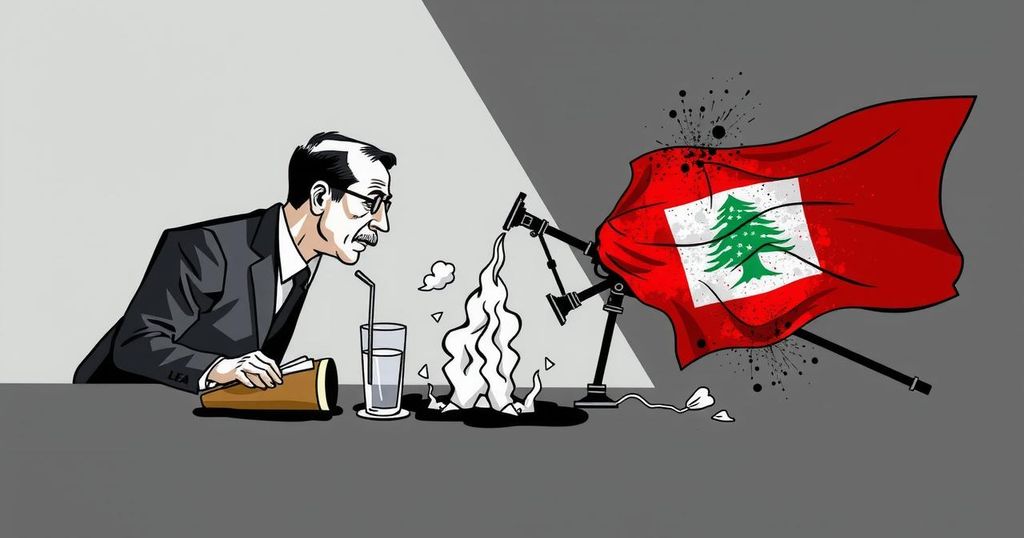The Israel-Lebanon ceasefire establishes a 60-day transitional period involving the withdrawal of Israeli forces, the deployment of the Lebanese army, and the relocation of Hezbollah’s heavy weapons. While it presents an opportunity for Lebanon to regain stability, challenges remain, including maintaining Hezbollah’s military influence and ensuring compliance with the agreed terms.
The recent ceasefire between Israel and Lebanon marks a pivotal moment, officially initiating a 60-day transitional period aimed at establishing stability along their shared border. This agreement entails the withdrawal of Israeli forces from southern Lebanon, the deployment of the Lebanese army, and the relocation of Hezbollah’s heavy weaponry. Following a period of intense conflict that involved missile strikes from Hezbollah and retaliatory airstrikes from Israel, both parties now seek to recalibrate their strategies under international supervision.
Israel’s determination to finalize this ceasefire stems from apprehensions regarding the potential loss of U.S. mediation. Washington’s warnings about possible Security Council resolutions that could adversely affect Israel’s standing were a significant motivating factor. Domestically, Prime Minister Netanyahu faces criticism from right-wing factions that view the ceasefire as an opportunity for Hezbollah’s resurgence, further complicating the political landscape.
Furthermore, the ceasefire agreement includes a five-member committee tasked with monitoring compliance, an essential component to prevent arms from reaching Hezbollah. Should both sides adhere to the terms over the 60-day period, it could enable Lebanon to reclaim its political stability while Israel escapes international sanctions, simultaneously allowing both nations to focus on regional dynamics.
Since the initiation of hostilities following Hassan Nasrallah’s call for war on October 8, 2023, Lebanon has endured severe humanitarian and economic fallout from Israeli attacks. This ceasefire represents a crucial opportunity for Lebanon to reassess internal power structures and potentially diminish Hezbollah’s stronghold over national affairs. However, internal pressures within Hezbollah could undermine any long-lasting peace as the group balances its military aspirations with political realities.
In this context, it remains essential for Lebanon’s political factions to engage in constructive dialogue, recognizing that excluding groups such as Hezbollah from future political arrangements could lead to renewed sectarian violence and instability. The comprehensive engagement of all societal sectors is vital for establishing a durable peace.
The Israel-Lebanon conflict has historically revolved around the strategic and sectarian rivalry in the region, with Lebanon often acting as a battleground for Iranian and Israeli interests. Hezbollah, backed by Iran, has maintained a dominant position in Lebanese politics and military affairs, complicating efforts for national unity and sovereignty. This ongoing power struggle has escalated since the October 2023 declaration of war, following escalating tensions in Gaza, prompting urgent calls for a ceasefire to prevent further humanitarian crises and potential civil unrest. The failure to achieve peace could result in Hezbollah reclaiming lost ground, thereby perpetuating a cycle of violence and instability that has plagued Lebanon for decades.
The ceasefire agreement presents both challenges and opportunities for Israel and Lebanon. While it offers a chance for Lebanon to regain political stability and mitigate Hezbollah’s influence, the potential for future conflict looms due to unresolved tensions. As internal and external pressures continue to shape the region, the successful implementation of the ceasefire will depend on the commitment of all parties involved. For a lasting resolution, inclusive dialogue and the participation of all societal factions, including Hezbollah, remain imperative to prevent repeating the mistakes of the past.
Original Source: www.dailynewsegypt.com






